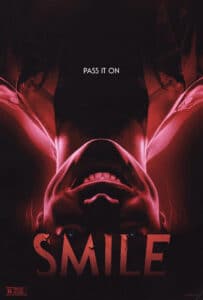
Smile
Psychiatrist Rose Cotter hides a trauma of her youth: she witnessed her mother’s suicide, without intervening in any way and then unable to forgive herself for it. The young Laure goes to her treatment, traumatized in turn for having witnessed the violent suicide of her teacher, and tells her a story of demonic possession, with vivid hallucinations, before killing herself in a horrible way. In Laure’s story, the premise to a violent event is always constituted by a disturbing smile, which appears on the face of these hallucinations, and drives the victim towards madness.
In line with a substantial part of the horror production of the third millennium, Smile does not seek to amaze with originality, but uses other instruments of terror.
Debutante Parker Finn develops the subject of his previous short film Laura Hasn’t Slept, awarded at the SXSW Festival, extending it to almost two hours, and necessarily elaborating a more complete genesis of the “possession” in progress. To do this he rests on a script he has already seen, that of the so-called “chain of S. Antonio”, made famous by The Ring and reworked by It Follows, according to which an implacable curse is transferred from one victim to another until someone has interrupted the sequence.
The prodromes of Smile are found more in David Cameron Mitchell’s film than in Hideo Nakata’s, due to the mode of appearance of the supernatural element and the ability of these not to be seen except by the victim. By way of compensating for this oppressive feeling of déja vu, Smile introduces some details that lower the situation into the discomfort of contemporaneity.
So much the forced smile – a clear symbol of the need to exhibit a mood rarely corresponding to the truth – that the need for the demon of an audience to influence clearly refers to social networks and the often distorted dynamics of today’s socialization. An interesting element, albeit not very detailed, which increases the discomfort in the viewer and the identification with the protagonist, struggling with a triply distressing situation.








